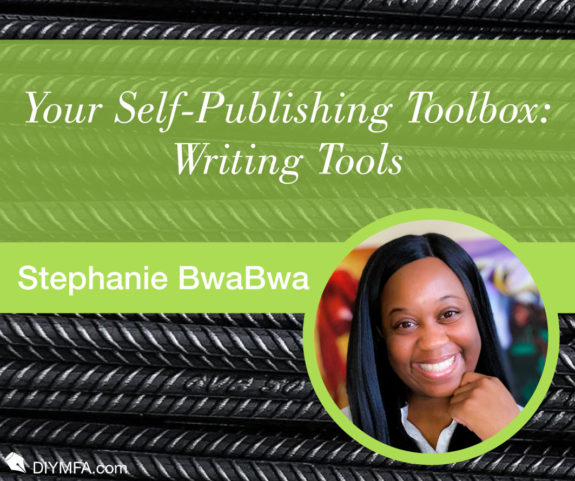Every author needs a toolbox that will be of use to them for years to come. You wouldn’t begin building a home without one. Neither should you dive into your author career without one.
An author’s toolbox is essential. Within will be the resources you revert to, time and again, to write, edit, publish, and market your books. While every story you pen will begin from scratch, your toolbox will make putting it all together far simpler.
In this article you’ll find a list of self-publishing tools, specifically for writing your stories, I highly recommend for your authorial success. Most of these writing tools I use myself, and can confidently say they will be of great service to you as they have been to me for many years.
*Please Note: In this article, we will focus on writing tools. In subsequent articles, I will share the best tools for editing, publishing, and marketing.
Writing Tools
Scrivener
Scrivener is the go-to app for writers of all kinds, used every day by best-selling novelists, screenwriters, non-fiction writers, students, academics, lawyers, journalists, translators and more. Scrivener won’t tell you how to write—it simply provides everything you need to start writing and keep writing.
I have used Scrivener for many years. It hasn’t always been perfect, but it has been the best tool possible for me when it comes to writing my novels. There are many functionalities I love about it, and this writing tool is always my first suggestion for a writers’ toolbox.
Microsoft Word
Microsoft Word is a word processor software developed by Microsoft in 1983. It is the most commonly used word processor software. It is used to create professional-quality documents, letters, reports, resumes, etc, and also allows you to edit or modify your new or existing document.
When I first began writing for publication, back in 2013, Word was the first tool I used, primarily because it was the one tool I knew. I wrote in Word for years before switching to Google Docs, and then finally finding the magic that is Scrivener. Word is wonderful for beginners, especially if you already own the software. Depending on what you’d like to do during the writing process, you may find yourself itching for a more efficient tool for authors. But if you need to get typing right away, Word is a great way to start and go.
4thewords
4thewords is an online writing game and community. It helps you write more using game mechanics like monsters, item rewards, quests, and a fully immersive world to explore. 4thewords is here to push your daily word count and to help you maintain a consistent writing habit.
I myself have not used 4thewords yet, albeit I plan to. One of my best friends, Angela J. Ford, swears by 4thewords. This is how she has successfully published over 20+ bestselling novels throughout the last several years. If you’re into RPGs, or you’re a gamer of any kind, this tool will help you pen your novel while you’re having a world of fun. If you need something more interactive to get you writing, this writing tool will be a great option for you.
Google Docs
Google Docs is a free web-based application in which documents and spreadsheets can be created, edited, and stored online. Users of Google Docs can import, create, edit, and update documents and spreadsheets in various fonts and file formats, combining text with formulas, lists, tables, and images.
After Scrivener, Google Docs is my best friend! But nah, for real. While it may not have all the fun features of Scrivener, it’s quite efficient and is a great tool. I often draft in Scrivener, but I edit in Google Docs. It’s wonderful to use as well if you also have software such as ProWritingAid or Grammarly (more on these in a subsequent article).
If you don’t have a Google account, I highly recommend creating one so you can have immediate access to Google Docs, whether you want to use it to draft or edit your manuscript. Google Docs is also where most editors will send your manuscript for you to confirm their changes for your polished novel.
Pen and Paper
This goes without saying. Most of us are still pen and paper writers. Even if it’s only for the early stages. There’s something about fleshing out ideas in a notebook, or the back of a napkin, or the edges of mail you’ll never read, that stimulates your imagination and fosters your creativity. Keep a few notebooks on hand with working pens close by. Story ideas are always brewing, and you want to be ready when they decide to pay you a visit.
Here’s your permission to go to Target, Michaels, and Hobby Lobby, and splurge on all the notebooks and stationary your heart desires!
The above writing tools may not seem profound, but you’ll be pleasantly surprised at the wonders they do for your career as you use them. The longer you use a tool, the more familiar you become with it, the more your creativity will find a home within it. This makes for easier writing and better storytelling.
Soon I will share with you the best editing tools. For now, pick one of the above writing tools and get storytelling. Share with me below which tool is your favorite, which one you use now, and what you will give a go in the future.
Disclaimer: There are no affiliate links in this article that will profit the Columnist, Stephanie BwaBwa. She genuinely loves and uses these tools herself, and sincerely hopes your authorial career benefits from them. If you’re on the fence, don’t be. There are no gimmicks here. Just value.
Tell us in the comments: What writing tools do you use? Are there any not on this list?

Stephanie BwaBwa is a Christian Fantasy Novelist. She’s the creator of the universe: Elledelle – about angels in magical worlds with impressive power that mirror the human condition.
Stephanie is a Canadian-born, Haitian-raised, Congolese descended, North American dweller who lived a colorful life in south Florida that cultivated a perspective on the world as unique as her background.
She’s the author of the YA fantasy series: The Seraphim Resistance Prequels and The Transcendents Serial, as well as the writing guide, Fantasy Fundamentals for Christian fantasy writers.
You can usually catch her going for a walk through a park, or simply binging Disney+ with too many snacks. Get in contact with Stephanie directly at: stephaniebwabwa.com or follow her on Instagram or Goodreads.







